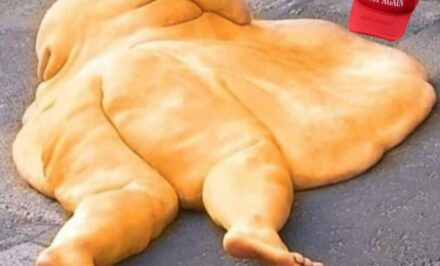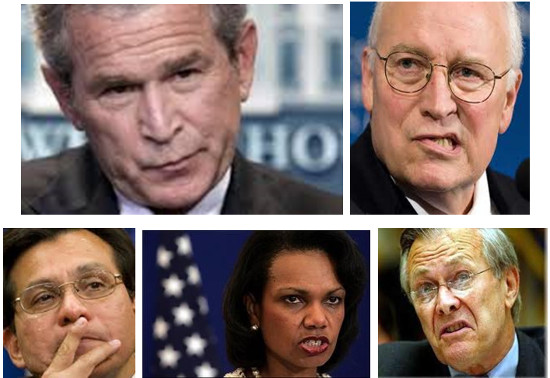
UGLY AMERICANS. At liberty today, despite their bloody lies and crimes against humanity, are (clockwise from top left): George W. Bush, Richard B. Cheney, Donald H. Rumsfeld, Condoleezza Rice, and Alberto Gonzales.
Impeach U.S. War Criminals
…With help from Hollywood, via ‘Reality TV’
(Better late than never)
by Thomas Adcock
Copyright © 2014 – Thomas Adcock
NEW YORK CITY, near America
In Hollywoodspeak, the term “elevator pitch” refers to hasty conversation between Scriptwriter with a hot concept and Studio Executive physically trapped into listening during the minute or so it takes to get from one floor to another. Due to the time constraint, and the famously short attention span of the average studio exec, brevity is the soul of a sale.
From time to time, I have been successful in such commercial strategy. And I wish to be so again—for reasons of personal gain and, if I may, patriotism. These would be the twin motivators driving a hot concept of current contemplation. What might seem whimsical has, in fact, serious purpose and strong potential for political catharsis here in America: a so-called reality TV series in which the high drama of Congressional impeachment is aimed at George W. Bush and Richard B. Cheney.
As president and vice president, respectively, from 2001-2009, Messrs. Bush and Cheney smirked and snarled their way through an eight-year disaster of ineptitude, insensitivity, cronyism, and criminality. Neither they nor their appointed cohorts have been held to account—and are not likely to. The least we might have, by way of justice, is an ersatz impeachment.
A contemporary show trial, so to speak, could prove as tantalizing as the actual impeachment proceedings against President Richard M. Nixon in 1974—brought to us live on television, day after day. Back then, the nation was transfixed; viewership ratings were off the charts.
Fast forward through the decades to a question that seems always before us: Does the United States have sufficient integrity to concede shameful conduct at the highest levels of government? Sufficient integrity to indict shameful “evildoers,” as Mr. Bush would say?
In 1974, the answer was “Yes.”
Yes to holding Mr. Nixon responsible for the eponymous “Watergate scandal,” in which the president directed his henchmen to burglarize the headquarters of his political opponents—a common and squalid crime, covered up with lies and sleazy bribes. Yes to impeaching Mr. Nixon, which forced his welcome resignation.
But in the matter of Messrs. Bush and Cheney, who authorized profoundly more serious offense in the aftermath of 9/11, the answer was and still is “No.”
No, say both the Democratic Party and the Republican Tea Party; No, we will not bring low the liars who led us to fraudulent war in Iraq and Afghanistan. No, we will not place Mr. Bush or Mr. Cheney or their co-conspirators on the impeachment dock. And No—we will not rise above the dishonesty of parroting liars’ euphemisms for torture inflicted by sadists on the payroll of the Central Intelligence Agency.
If the political establishment of the United States is unwilling to come clean on the Bush-Cheney crime spree, then who or what will?
Who will advance truth, and perhaps reconciliation?
Credit Hollywood for telling much of the American saga. And here now, Hollywood can add more to the story of our nation, for better or for worse.
•
Soon now—perhaps as early as next week—Americans will read an official admission of heinous war crimes executed in their name by George Bush and Dick Cheney. I speak, of course, of the recently declassified 480-page executive summary of a sickening 6,200-page report on C.I.A. torture at the behest Bush-Cheney, et al.
The report is likely to include a methodology heretofore referenced in only three venues: the 2007 American film “Taxi to the Dark Side,” produced by the documentarian Alex Gibney; the campus newspaper at Notre Dame University in South Bend, Indiana; and in the space I am afforded here at CulturMag.
 In the fall of 2006, John Yoo—a former White House lawyer in service to George Bush and Dick Cheney—made a speaking tour of American law schools, which included an appearance at Notre Dame. A student in the audience asked Mr. Yoo if he had regrets about endorsing a particular form of torture while on staff at the Office of Legal Counsel, the Justice Department’s liaison to the White House.
In the fall of 2006, John Yoo—a former White House lawyer in service to George Bush and Dick Cheney—made a speaking tour of American law schools, which included an appearance at Notre Dame. A student in the audience asked Mr. Yoo if he had regrets about endorsing a particular form of torture while on staff at the Office of Legal Counsel, the Justice Department’s liaison to the White House.
The method at question: the twelve-year-old son of an Afghani civilian suspected of terrorist “connections” was ordered by C.I.A. interrogators to drop his trousers, whereupon one of the sadists smashed the boy’s testicles with a hammer—as his father was forced to witness. (Some weeks later, the father was cleared of suspicion.)
Mr. Yoo’s response to the boy’s treatment, according to multiple sources I personally consulted: “Well, he didn’t die.”
But Mr. Yoo, who today holds a professorial sinecure at the University of California/Berkeley, was one of numerous bit players in a theatre of cruelty apparently overseen by Mr. Cheney, who frequently left Washington to make hush-hush visits to C.I.A. headquarters in Langley, Virginia.
“I do believe that during the Bush-Cheney administration, Vice President Cheney set a tone and an attitude for the C.I.A.,” said Congresswoman Nancy Pelosi in a television interview last week. “And I think he’s proud of it.”
Mr. Cheney confirmed as much, likewise before television cameras. Speaking on the subject of what he prefers to call “enhanced interrogation techniques,” and knowing of the imminent Congressional disclosure of C.I.A. depravities, he said in a March 14 interview, “Some people call it torture. It wasn’t torture. If I would have to do it all over again, I would.”
In the Washington Post newspaper of March 31, an article containing leaked contents of the full report provides a second example of C.I.A. techniques Mr. Cheney would countenance. In the case of one prisoner of war, according to the article, “[I]nterrogators forcibly kept his head under the water while he struggled to breathe and beat him repeatedly, hitting him with a truncheon-like object and smashing his head against a wall.”
Mr. Cheney—and his boss in theory, the feckless Mr. Bush—clearly differs with the definition of torture set forth in the United Nations “Convention against Torture and Other Cruel, Inhuman or Degrading Treatment or Punishment,” an international agreement of 1984 initiated by Washington:
The term ‘torture’ means any act by which severe pain or suffering, whether physical or mental, is intentionally inflicted on a person for such purposes as obtaining from him…information or a confession, punishing him for an act he or a third person has committed, or is suspected of having committed, or intimidating or coercing him or a third person, or for any reason based on discrimination of any kind, when such pain or suffering is inflicted by or at the instigation of or with the consent or acquiescence of a public official or other person acting in an official capacity.
•
As I write, advisors to President Barack Obama are reviewing the report’s summary document with an eye to redacting portions that might legitimately compromise national security. Within weeks from today, Mr. Obama is expected to release what constitutes the government’s admission of Bush-Cheney crimes—namely a policy of torturing prisoners of war; a policy Mr. Obama aborted as the first executive act of his first day in office.
The full report’s 6,200 damning pages were drafted by the U.S. Senate Intelligence Committee, chaired by Senator Dianne Feinstein.
 “The report exposes brutality that stands in stark contrast to our values as a nation [and] chronicles a stain on our history,” said Ms. Feinstein on the day her committee voted to disclose the summary of findings and conclusions (pending White House review). “It is now abundantly clear that, in an effort to prevent further terrorist attacks after 9/11 and bring those responsible to justice, the C.I.A. made serious mistakes that haunt us to this day. We are acknowledging those mistakes, and we have a continuing responsibility to make sure nothing like this ever occurs again.”
“The report exposes brutality that stands in stark contrast to our values as a nation [and] chronicles a stain on our history,” said Ms. Feinstein on the day her committee voted to disclose the summary of findings and conclusions (pending White House review). “It is now abundantly clear that, in an effort to prevent further terrorist attacks after 9/11 and bring those responsible to justice, the C.I.A. made serious mistakes that haunt us to this day. We are acknowledging those mistakes, and we have a continuing responsibility to make sure nothing like this ever occurs again.”
 As Ms. Feinstein spoke those words—during a Washington press conference on the afternoon of Thursday, April 3—Mr. Bush was busily preparing for an exhibition of his latest in soulless kitsch: oil paintings of world statesmen, including himself. The exhibition is set for début on Friday, April 4, at his presidential library near Dallas; adult admission tickets run at $16 each (€11.59). Among his preparations, Mr. Bush recorded an interview with his daughter, the happy-talk television correspondent Jenna Bush Hager, in which the president-cum-portraitist touted the “Rembrandt inside me.”
As Ms. Feinstein spoke those words—during a Washington press conference on the afternoon of Thursday, April 3—Mr. Bush was busily preparing for an exhibition of his latest in soulless kitsch: oil paintings of world statesmen, including himself. The exhibition is set for début on Friday, April 4, at his presidential library near Dallas; adult admission tickets run at $16 each (€11.59). Among his preparations, Mr. Bush recorded an interview with his daughter, the happy-talk television correspondent Jenna Bush Hager, in which the president-cum-portraitist touted the “Rembrandt inside me.”
Meanwhile, Mr. Obama has said nothing. But we know of his reluctance to render justice in the case of the Bush-Cheney crime spree—though in other cases of villainy, the president is partial to drone attacks known to kill innocent bystanders—and his curious equivocation in the matter of C.I.A. brutality.
“I don’t believe that anybody is above the law,” declared Mr. Obama in a January 2009 interview on NBC-TV, aired the week prior to his inauguration. “On the other hand, I also have a belief that we need to look forward as opposed to looking backward.”
Pressed by his interviewer to be a wee bit more forthcoming, Mr. Obama added, “[P]art of my job is to make sure that, for example at the C.I.A., you’ve got extraordinarily talented people who are working very hard to keep Americans safe. I don’t want them to suddenly feel like they’ve got to spend all their time looking over their shoulders and lawyering up.”
So, the interviewer asked, you will not appoint a special commission to seek the truth and mete out penalties? You will not at least require “evildoers” to confess their sins?
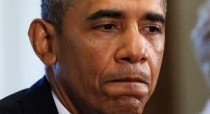 The president-elect responded, repetitively, “[M]y instinct is for us to focus on how do we make sure that, moving forward, we are doing the right thing…[M]y orientation’s going to be to move forward….Not to be swayed by day-to-day politics. …[M]y general belief is that when it comes to national security, what we have to focus on is getting things right in the future as opposed to looking at what we got wrong in the past.”
The president-elect responded, repetitively, “[M]y instinct is for us to focus on how do we make sure that, moving forward, we are doing the right thing…[M]y orientation’s going to be to move forward….Not to be swayed by day-to-day politics. …[M]y general belief is that when it comes to national security, what we have to focus on is getting things right in the future as opposed to looking at what we got wrong in the past.”
Mr. Obama has demonstrated a capacity for critical thought, appreciation for American literature, and a realization that unresolved grievances are of great significance. Such sensibilities coalesced in a speech he delivered during the presidential campaign of 2008. On March 18 of that year, then-Senator Obama, candidate of the Democratic Party, addressed the National Constitution Center in Philadelphia on the matter of festering resentments over the course of America’s four centuries of troubled race relations—troubles that continue to cost America dearly in terms of violence against individuals, against an entire people, and against society as a whole.
Paraphrasing a line of dialogue from the 1950 novel “Requiem for a Nun” by Nobel Prize-winning author William Faulkner (1897-1962), candidate Obama said, “The past isn’t dead and buried. In fact, it isn’t even past.”
Literature, as the author in Mr. Obama would attest, heightens our awareness of life—on the page and off. Life in all its bigness and loudness and banality and complexity; life, with its improbabilities, both noble and base; life, with its manifold nuances of falsehood and truth. Even the lowest of literary forms—television, the toffee-snouts would say—can be, and frequently is, illuminating.
Which returns us, dear reader, to the business of Hollywood, where the late Mr. Faulkner himself toiled as a part-time scriptwriter. (That is, when not carousing with his drinking buddies, Humphrey Bogart and Lauren Bacall. The three were habitués of the Musso & Frank Grill on Hollywood Boulevard, a glorious saloon and steakhouse that survives to this day. )
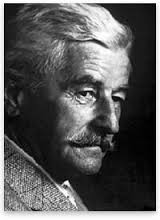 In 1929, Mr. Faulkner published his fourth (initially unsuccessful) novel, “The Sound and the Fury.” It is a tale of dissolution among members of an aristocratic family of the South. Even so, perhaps the most memorable lines from the novel apply to the dishonor of barbarous military tactics—as recently committed in Bush-Cheney invasions of Iraq and Afghanistan:
In 1929, Mr. Faulkner published his fourth (initially unsuccessful) novel, “The Sound and the Fury.” It is a tale of dissolution among members of an aristocratic family of the South. Even so, perhaps the most memorable lines from the novel apply to the dishonor of barbarous military tactics—as recently committed in Bush-Cheney invasions of Iraq and Afghanistan:
“…I give you the mausoleum of all hope and desire… [N]o battle is ever won, they are not even fought. The field only reveals to man his own folly and despair, and victory is an illusion of philosophers and fools.”
•
Perhaps at the conclusion of this essay I might journey westward to the palm trees and sound stages of Los Angeles, there to seek audience for my back-to-the-future concept: a ratings lollapalooza in the form of a reality TV, namely the retroactive impeachment of George Bush and Dick Cheney.
Hollywood actors would comprise a cast of gangsters in an episodic drama that would become a teachable moment in its depiction of violent fools waging a war in the camouflaged cause of Almighty Oil, the wellspring of both the Bush and Cheney family fortunes.
The elevator pitch: He lied, they died—and now, who thrives?
The script has already been outlined, by no less a jurisprudential consultant than Ramsey Clark, who served as U.S. attorney general from 1967-69 under President Lyndon Johnson. Midway through the Bush-Cheney regime, Mr. Clark, among many others, called for impeaching the president and vice president—and a trio of subordinate evildoers:
- Donald H. Rumsfeld, ex-secretary of defense. He insists to this day that “enhanced interrogation”— waterboarding, for instance, a technique perfected by Tomás de Torquemada during the Spanish Inquisition of 1478—does not amount to torture.
- Condoleezza Rice, ex-national security adviser to the president. A recent member of the Chevron Oil Company’s board of directors and namesake of a company tanker ship, Ms. Rice plies the Republican Tea Party lecture circuit nowadays. Her fee for blathering bromides and platitudes is said to be $150,000 (€109,000) per performance.
- Mr. Gonzales, ex-attorney general who rubber-stamped specious raison d’êtres for military invasion, secret imprisonment, and torture. Known to his Secret Service detail as “Fredo” (after the hapless Corleone brother in the “Godfather” saga of American Mafiosi), Mr. Gonzales is today an unemployed lawyer. He last surfaced in newspaper headlines in December 2008 when he told the Wall Street Journal that he was busy writing a memoir, though he had not yet mustered interest from book agents or publishers.
Mr. Clark’s suggested bill of impeachment ticks off twenty alleged crimes, any of which could serve as predicate for prosecution under Article II, §4 of the Constitution: “The president, vice president, and all civil officers of the United States shall be removed from office on impeachment for, and conviction of, treason, bribery, or other high crimes and misdemeanors.”
The American corporate media—ever obedient to power, in accordance with journalistic “objectivity”—have ignored Mr. Clark’s case. Nevertheless, he persists in identifying “violations and subversions of the Constitution…in an attempt to carry out, with impunity, crimes against peace and humanity, and war crimes.”
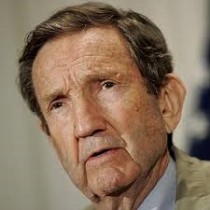 Mr. Clark maintains that the Bush-Cheney gang “committed violations and subversions of the Constitution of the United States of America in an attempt to carry out with impunity crimes against peace and humanity and war crimes and deprivation of the civil rights…by assuming powers of an imperial executive unaccountable by law and by usurping powers of the Congress, the Judiciary, and those reserved to the people of the United States.”
Mr. Clark maintains that the Bush-Cheney gang “committed violations and subversions of the Constitution of the United States of America in an attempt to carry out with impunity crimes against peace and humanity and war crimes and deprivation of the civil rights…by assuming powers of an imperial executive unaccountable by law and by usurping powers of the Congress, the Judiciary, and those reserved to the people of the United States.”
Among Mr. Clark’s twenty accusations are these:
- Creation of a “secret and illegal wiretapping and spying operation” through the National Security Agency. (Calling Edward Snowden!)
- “[M]anipulating the media and foreign governments with false information…to create a climate of fear and [to] destroy opposition to U.S. wars of aggression and first-strike attacks.”
- “Authorizing, ordering and condoning assassinations, summary executions, kidnappings, secret and other illegal detentions of individuals, torture and physical and psychological coercion of prisoners to obtain false statements.
Now comes the Senate Intelligence Committee report, which will dovetail with Mr. Clark’s allegation of torture. And now comes opportunity for impeachment, at least by way of Hollywood portrayal.
Better late than never.
Thomas Adcock
Thomas Adcock is America correspondent for CulturMag.


